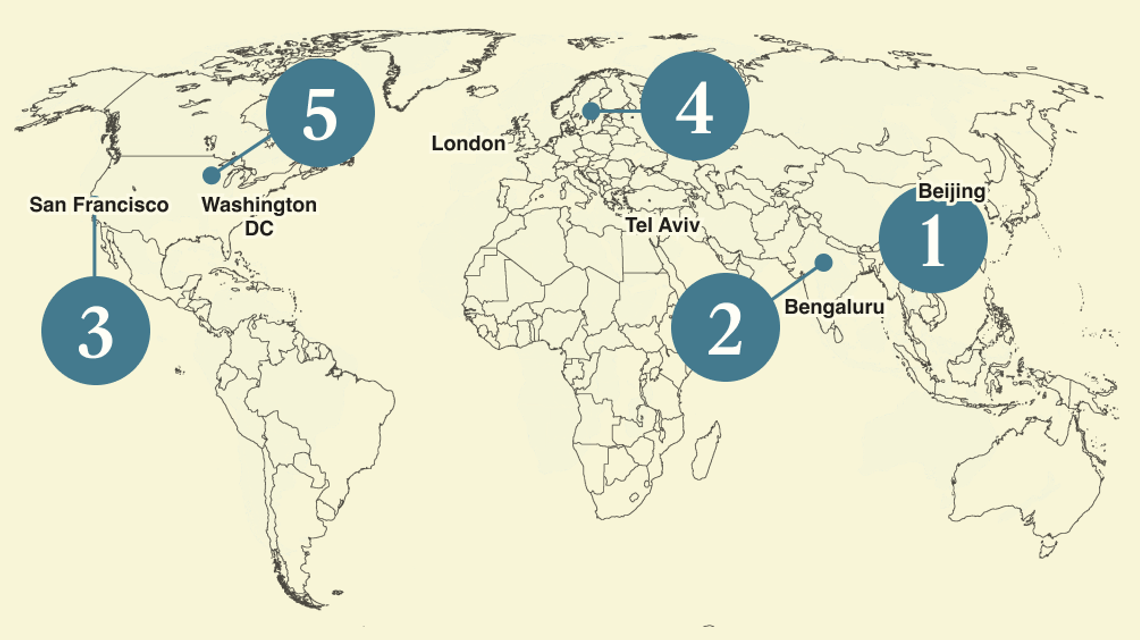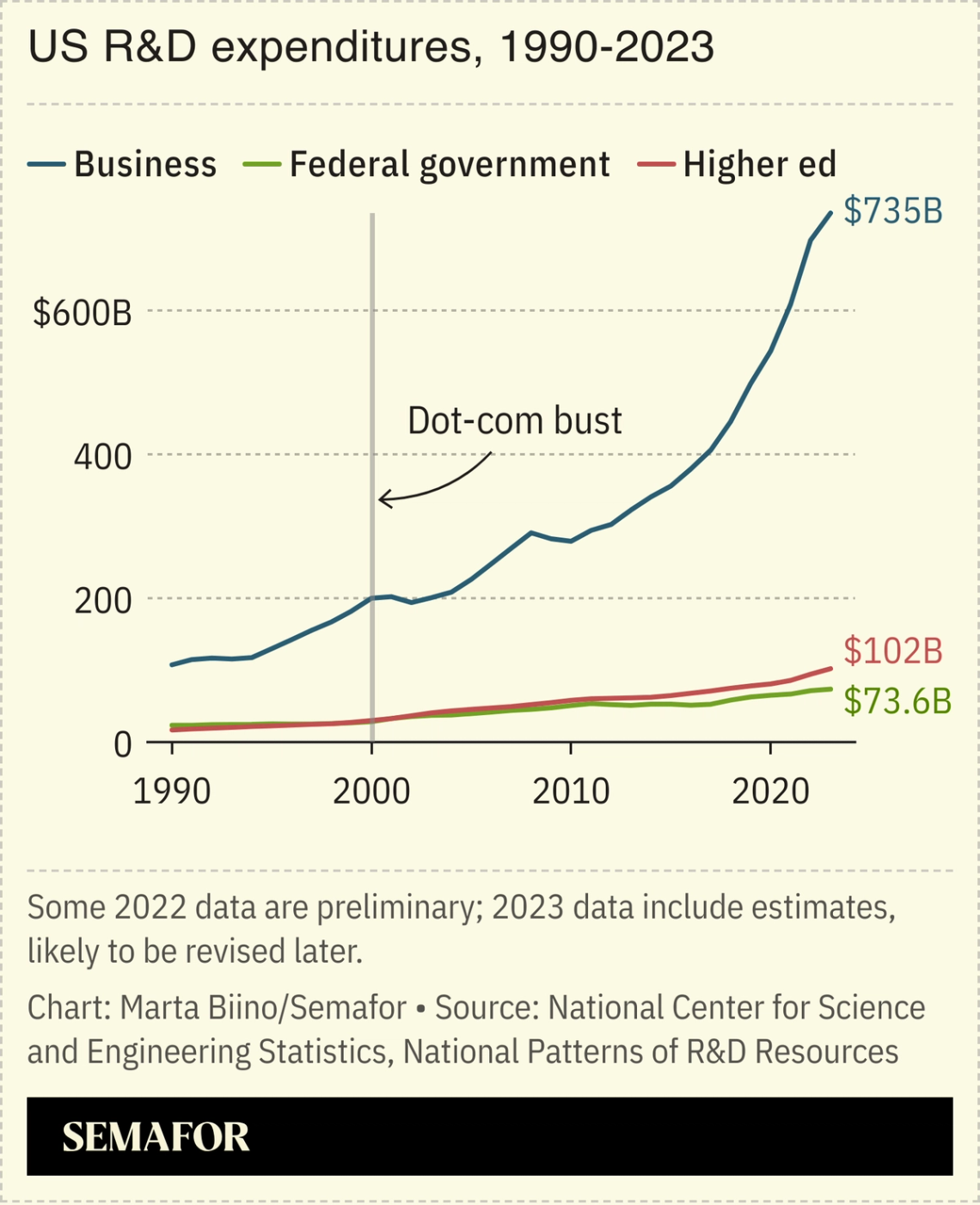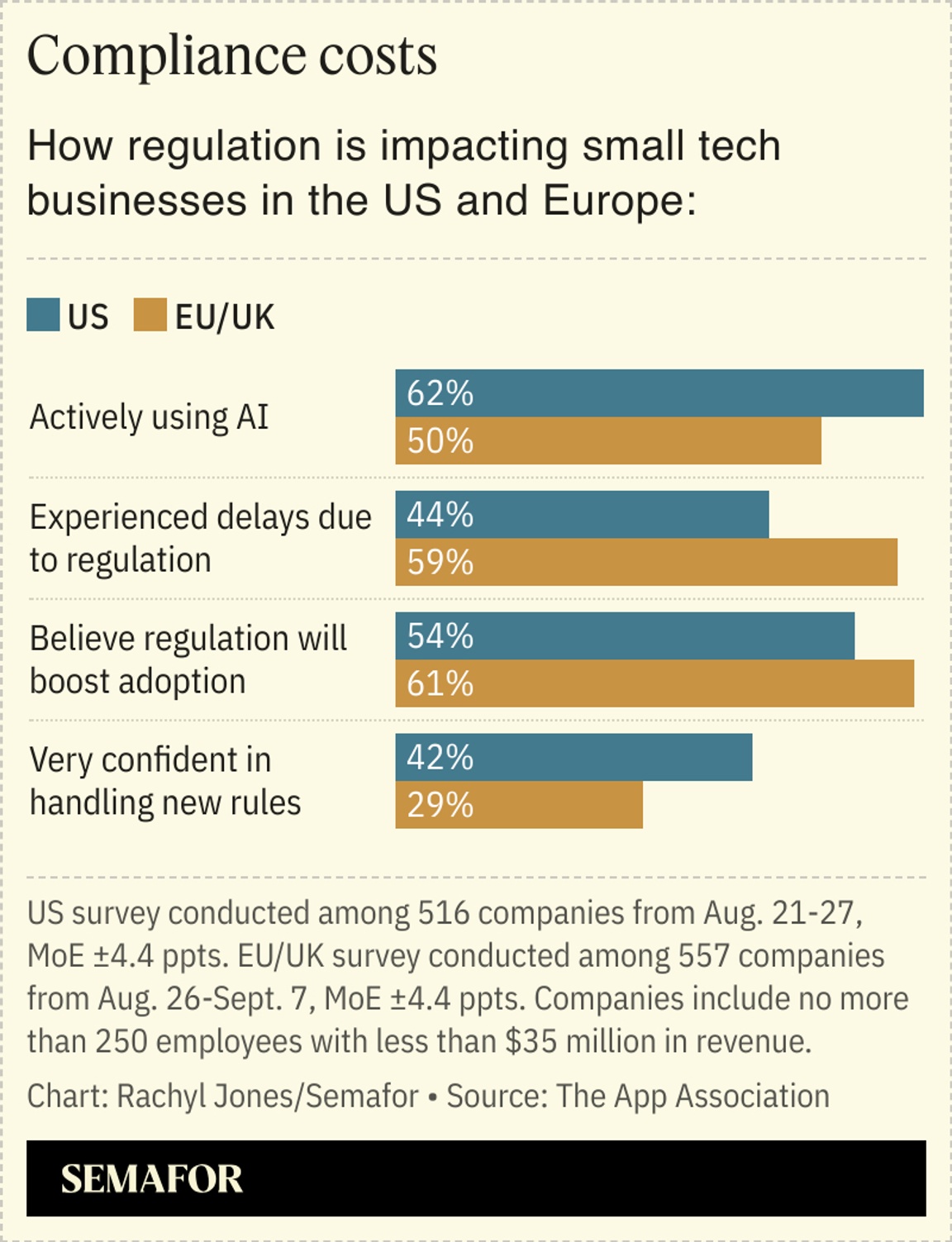| | In this edition, why AI could be resilient to booms and busts, and the latest tech firm caught in th͏ ͏ ͏ ͏ ͏ ͏ |
| |  | Technology |  |
| |
|
 - Bargaining chips
- Chatbot commerce
- AI insurance woes
- The cost of EU rules
- Thirsty data centers
 Why an AI ‘bubble’ lifts all ships, and people are using AI as legal counsel — and winning. |
|
 Comparisons between the AI boom and dot-com bubble (remember Pets.com?) abound. But there’s an important distinction to keep in mind: The financial speculation in the latest tech explosion is unrelated to the potential economic benefits. After the dot-com crash in 2000, the stock market tanked and venture capital funding plummeted. People had trouble separating the bubble from the level of innovation. The Wall Street Journal noted in 1996 that internet companies were propping up the stock market. Economists worried that the technology didn’t do enough to improve productivity to justify the hype. Some investors ran away from the internet after the bubble burst, but by one measure, the crash never even happened. Annual research and development spending by US companies, which hit $202 billion in 2000, only dipped slightly the following year and never again fell below $200 billion. In 2023, it was at $735 billion.  Not all of that was Silicon Valley companies, but a significant portion of it was. Companies like Google and Amazon kept on building and never missed a beat. The internet turned out to be the most important economic driver in the decades that followed, and the infrastructure built to support it turned out to be necessary. Even venture capital spending, when viewed from 1995 to 2022, wasn’t knocked off its steady growth trajectory. It’s often difficult to predict how people will make use of new technology. It helps to think of AI more as a continuation of human innovation. Throughout history, people have found ways to automate tasks or make them easier. There may be a bubble and a crash, but this new and powerful advance in automation will continue to be big business and lead to long term economic growth. Plus: Catch my interviews with tech executives including the CEOs of Qualtrics, Synopsys, and the head of autonomous mobility and delivery at Uber, next week during Semafor’s World Economy Summit. You can request an invite here. |
|
Qualcomm joins tech firms in US-China crosshairs |
 Albert Gea/File Photo/Reuters Albert Gea/File Photo/ReutersQualcomm is the latest company to get caught between the US-China crossfire. Beijing opened an antitrust investigation against the chipmaker and its proposed acquisition of Israel’s Autotalks, probing whether Qualcomm failed to disclose certain details of the deal. The move comes as the two governments continue to hash out a trade truce that has dragged Nvidia and other tech companies as potential bargaining chips. For companies looking at M&A, China is more of a wild card than usual, and will likely be a tool for the government even if Presidents Donald Trump and Xi Jinping reach an agreement. On another US-China front, G42 said it has the protocols in place to safely house — and own — the world’s most advanced semiconductors despite reportedly being left out of the Trump administration’s deal to export Nvidia chips to the UAE, Semafor’s Kelsey Warner reports. The AI conglomerate is relying on “gold-standard” security measures to prevent semiconductors from being diverted to China, a person familiar with the matter said, as further export licenses for cutting-edge Nvidia chips remain in limbo. The US green-lit chip exports to the UAE, but only for American companies such as Oracle in deals worth billions of dollars, Bloomberg previously reported. |
|
India pilots chatbot payments |
 Courtesy of Razorpay Courtesy of RazorpayChat, buy bananas. India is launching a pilot allowing consumers to pay for products directly through AI chatbots using its government-backed Unified Payments Interface, the country’s popular instant payment platform, TechCrunch reported. The tooling will first become available through ChatGPT, and later via Gemini and Claude. The move follows a similar announcement for ChatGPT payments in the US but marks the first government-backed initiative of chatbot transactions in the world. It makes India a global test case for chatbot commerce, offering a model of what could come in other major markets. Bengaluru-based fintech firm Razorpay developed the integration for merchant participants, which so far includes online grocer BigBasket and telecom company Vi. OpenAI won’t earn a share of the sales, but the capability could boost stickiness in one of the top consumer markets. |
|
Insurers grapple with covering AI claims |
 Chance Yeh/Getty Images for HubSpot Chance Yeh/Getty Images for HubSpotOpenAI and Anthropic are considering tapping investor funds to settle AI-related lawsuits in lieu of insurers who won’t fully cover AI risks, the Financial Times reported. A series of authors and The New York Times are suing the ChatGPT maker over copyright infringement in what could amount to billions of dollars in damages. It is also facing a lawsuit by the family of a teen who died by suicide after claims he was using ChatGPT. The company has secured some coverage for emerging AI risks from insurer Aon. The report cited disputing coverage figures, though as much as $300 million could be insured — far less than the possible payouts required by OpenAI. Meanwhile, the company has raised $60 billion from investors. A California judge has preliminarily approved for Anthropic to pay $1.5 billion to authors, some of which will come from its own funds, according to the FT. The company has raised $32 billion to date. The discussions reveal a gap in traditional insurers’ ability to provide sufficient capacity for the scale and risks of AI companies. The situation echoes earlier difficulties insurers had in pricing risk for cyber threats in the 2010s, which lacked historical context and led to massive losses. Insurance firms largely adapted — raising premiums, narrowing coverage, and utilizing data-driven risk models. While the potential damages are likely higher in AI, the cyber case offers a roadmap for insurance companies as they adapt to a new industry. |
|
 Garbage Day, an award-winning newsletter from tech reporter Ryan Broderick, stuffs as much internet junk as possible into one email. Memes, weird viral videos, internet drama, AI news — it’s all there. Subscribe to Garbage Day to make your inbox a little less professional and remember what it was like to have fun online again. |
|
Europe’s AI rules slow tech startups |
Stricter AI regulations in Europe have partially stunted growth for some of its local tech startups, causing them to trail behind competitors in the US who face fewer regulatory barriers, new data from trade group The App Association shows. Nearly 60% of small European tech companies surveyed said they have experienced delays in product development due to regulations, compared to 44% of small US companies, according to reports published Thursday and shared exclusively with Semafor’s Rachyl Jones. The US does not have an expansive federal AI law comparable to the EU’s new AI Act — which polices general-purpose AI and its risks — but states have started issuing their own rules, and companies are taking other regulatory cues from agencies like the Federal Trade Commission.  The impact goes beyond delays. One-third of European developers at small tech companies had to remove or downgrade features to comply with requirements, largely due to data handling and safety checks, while another 60% said they haven’t made such adjustments. And they are less confident than US startups that they will be able to comply with new laws, the study shows. |
|
Data centers need water, too |
 Joey Pfeifer/Semafor Joey Pfeifer/SemaforEcolab CEO Christophe Beck is warning that we are ignoring AI data centers’ insatiable hunger for water, with much of the attention focused instead on the energy needs. “Smart water management” across the business world has become imperative if we are to sustain the AI boom, he told Semafor’s Andrew Edgecliffe-Johnson. His $80 billion water treatment, hygiene, and infection protection business counts Microsoft and Marriott as customers. “The moment that you want to build a data center, people really face the truth,” he said. “And it turns really bad if you’re not ready for it.” |
|
 Alison Roman was one of digital media’s first food stars — she’s had recipes go viral since 2018 and an infamous “cancellation” in 2020. Now, with her latest cookbook, Something From Nothing, she’s trying to move away from life on the internet. This week, Ben and Max bring on the chef and author to talk about food media, the value of a physical cookbook in a digital world, and how AI is influencing her recipes. They also talk about why cooking, and her new book, are the “antithesis of the internet.” Listen to the latest episode of Mixed Signals now. |
|
 A court hearing in Germany. Marcus Brandt/Pool/AFP via Getty. A court hearing in Germany. Marcus Brandt/Pool/AFP via Getty.A woman in Long Beach, California, used AI as legal counsel to successfully overturn an eviction notice and rent penalties, in a case she previously lost with human legal representation, NBC News reported. ChatGPT’s premium service and Perplexity Pro helped her find holes in the judge’s decision, research laws, and write responses to the court. This isn’t the first time AI is showing up in the courtroom, but it’s a part of a broader movement of individuals seeking information and clarity from technology as they navigate a complex legal system, even when human counsel is available. Some are choosing to forgo those representatives altogether, electing to represent themselves with AI as a guide. But the technology isn’t foolproof. Legal experts told NBC that AI-written documents are often littered with false statements and nonexistent citations — errors that can bring sanctions from the court. |
|
|